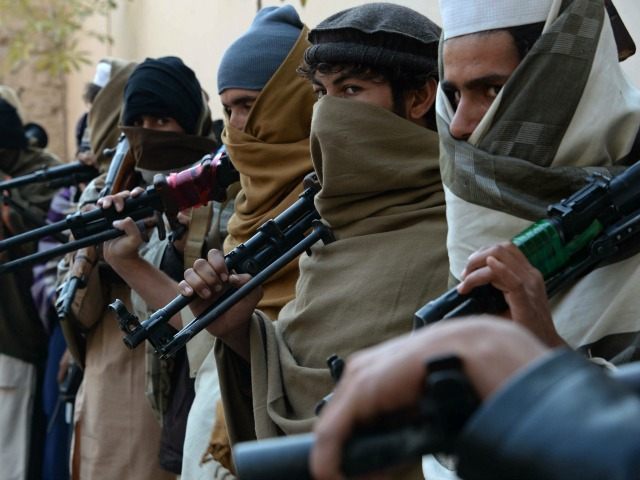Gen. John F. Campbell, who served as the top commander of U.S. and NATO forces “in Afghanistan until earlier this month,” has reportedly asked President Obama for the authority to offensively attack the Taliban again.
Citing unnamed military officials, the Washington Post reports that the request exposes “a rift between the military and senior administration officials over the U.S. role in the war in Afghanistan.”
The Post adds:
Senior Pentagon officials complained that Gen. John F. Campbell, who commanded U.S. forces in Afghanistan until earlier this month, broke with standard military procedure when he forwarded his proposal in recent weeks directly to the White House without the knowledge of Defense Secretary Ashton B. Carter.
Campbell said he followed normal channels in submitting his recommendations, which could draw the United States back into a broader air campaign against the Taliban.
In fact, Gen. Campbell, who is in the final weeks of a 37-year career in the Army, denied trying to go around the Pentagon.
“Absolutely NOT,” he told the Post in an email. “I forwarded my recommendations through my chain of command, always have and this time was no different.”
“An official at U.S. Central Command supported Campbell’s account,” notes the Post.
The Post adds:
Any escalation of the U.S. role underscores the ongoing vulnerability of Afghan forces and what is expected to be a violent 2016 summer fighting season, even as President Obama attempts to meet his campaign promise of ending the war.
President Obama took away the U.S. military’s authority to offensively strike the Taliban at the end of 2014, when he declared that American troops had ceased their combat mission in Afghanistan.
Since then, the U.S. military has only been able to attack the Taliban from a defensive position.
The Post explains:
Currently, U.S. commanders can strike the Taliban only when its fighters pose a direct threat to U.S. forces or when Afghan troops are in grave danger of being overrun. Campbell’s request to broaden authorities to strike the Taliban is one of the few levers at the military’s disposal to increase pressure on militant leaders and drive them to the negotiating table for peace talks.
The proposals made by Campbell, before he left Kabul on March 2, include authorizing some U.S. air support for Afghan operations against the Taliban, conducting strikes against Taliban leaders and placing American advisers with conventional Afghan forces closer to the front lines.
Despite an investment of nearly $70 billion in U.S. taxpayer funds and years of American military training, the Afghan security forces are struggling to hold back a resurgent Taliban, which some analysts believe controls more territory in Afghanistan than at any time since its regime was overthrown by the U.S. in 2001.
Many Taliban terrorists think “they are operating from a position of strength,” Gen. Campbell recently told troops at an American base in Afghanistan.
Although Gen. Campbell declined to provide specifics about his request, a senior military official, speaking on condition of anonymity, “described it as a stopgap measure to give the Afghan forces time to build up their tiny air force and intelligence capabilities over the next several years,” reports the Post.
“The way you end this insurgency is you got to beat them down to a lower level of violence,” said the military official. “The Afghans won’t have any real air power capability until 2017… We can take more of the edge off the enemy until their capabilities are fully online.”
An anonymous senior defense official told the Post that Carter is willing to enhance support for the Afghan forces and even target some Taliban leaders.
Nevertheless, “that doesn’t mean that he’s ready to veer in a different direction without a lot of careful analysis,” said the senior defense official. “There’s been no good, strong case for why doing that would change things in a way that’s helpful.”
“Secretary Carter has not made a recommendation to the President on further changes to the U.S. mission in Afghanistan,” Pentagon spokesman Peter Cook told the Post via email.

COMMENTS
Please let us know if you're having issues with commenting.